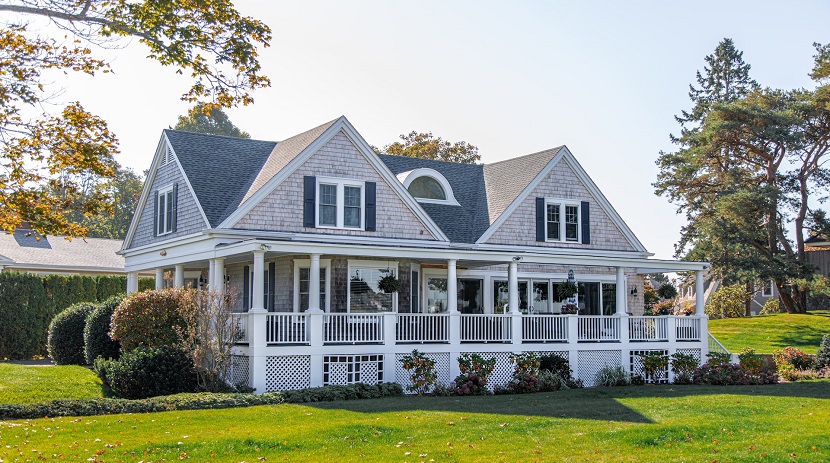Many analysts predicted that the real estate market would slow down as a result of the recently observed inflated home prices and high interest rates since prospective purchasers are finding it difficult to afford an inflated house, let alone the accompanying interest rates. It seems to be a slowdown that will happen gradually. The Case-Shiller National Home Price Index shows a 2.2% decline in home prices between June and September 2022. In order to finally enter the market, many prospective homeowners have been waiting for property prices to decline. To determine whether and how much the real estate market is slowing down, we will examine a number of statistics.
Sales of existing homes have decreased on the real estate market
The National Association of Realtors (NAR) reports that pending home sales decreased 4.6% in October. This occurred as a result of prospective homeowners being unable to obtain a mortgage due to increasing interest rates. The results showed that more affluent regions of the nation felt this the most. Additionally, the NAR reported a 5.9% decline in existing home sales from September to October. Existing house sales decreased for the ninth month in a row. Sales fell 28.4% on an annual basis, showing that potential purchasers were staying away from the real estate market due to the increased prices.

Mortgage application volume is decreasing
The amount of mortgage applications recently decreased by 1.9% compared to the prior week, according to the Mortgage Bankers Association. Because it reveals the number of persons wishing to enter the market, mortgage demand is a good indicator of the state of the real estate market. The demand for mortgages is declining as a result of the rising borrowing costs and rising housing prices. Real estate investors are either waiting for prices to fall much lower or they have sought alternative investment opportunities.
The cost of housing has not decreased
A lot of prospective homeowners hoped that the housing market would see some form of correction and prices would drop. In general, when interest rates rise, housing prices tend to decline. Not really, at least not quite yet. While existing house sales are declining, the median existing home sale price increased by 6.6% over the previous year to $379,100, according to statistics from the NAR. This is lower than the high price of $413,800 in June 2022, though. In October 2022, the annual growth rate of home prices was 10.1%, which was the lowest level since early 2021. These real estate statistics are puzzling because lagging indications continue to suggest high prices, yet recent data indicate that this trend is partially reversing. Although sales are waning, there is still a long way to go before prices are once again within reach.
Housing supply dropped once more on the real estate market
By the end of October 2022, there were 1.22 million unsold existing homes on the market, a 0.8% decrease from the previous month. This may be due to the fact that many homeowners who are considering relocating have secured advantageous rates in recent years and don’t want to lose out on them. Because the mortgage rate would be greater if they moved into a bigger or smaller home, homeowners choose to remain in their current residence. The lack of house supply and the robust labor market will probably keep the real estate market from collapsing.

Real estate prices should drop in 2023
A lot of experts and analysts have predicted that real estate prices will start to decline in 2023 as a result of concerns about a potential recession. According to economists, the rising mortgage rates should cause property prices to decrease even further. In September, the CoreLogic S&P Case-Shiller Index—which tracks changes in single-family home prices—saw a year-over-year increase of 10.6%, down from 13% in August. As a result, the annual rise for September was the smallest since December 2020, and it appears that the peak in home prices occurred roughly six months ago. With September marking the sixth month in a row that real estate price growth has slowed, it seems as though prices have reached a point of stability.
The annual pricing growth should hit 8% in December and then get to 0% in early 2023, according to CoreLogic’s Home Price Index estimate. If this occurs, it will signal the end of rising property prices. From there, it will be necessary to keep an eye on changes in real estate sales in order to gauge the magnitude and pace of the correction.

What can be anticipated in 2023?
According to Morgan Stanley, the average price of a home could drop by 10% between June 2022 and 2024. Home prices fell 27% between 2006 and 2012 during the previous housing market decline, but this time is very different due to a strong labor market and low inventory. Redfin has released its forecasts for 2023 as well. These important real estate forecasts that merit discussion will be broken down.
The number of homes sold will fall to its lowest level since 2011
Redfin anticipates a 16% decline in existing home sales in 2023 over 2022. This forecast is based on the fact that prospective homeowners may experience affordability issues as a result of high mortgage rates, high real estate prices, and a future recession. People won’t be as eager to relocate as they were when borrowing rates were extremely low during the epidemic months.
Rates on mortgages will decrease on the real estate market
Redfin predicts that mortgage rates might drop from roughly 6.5% to 5.8%, saving the buyer of a $400,000 property about $150 per month in mortgage payments. On the other hand, a prospective buyer who has been waiting may be able to buy a bigger home and have cheaper payments if home prices decline as interest rates drop. There are just no certainties, but this would be great for someone seeking to enter the real estate market in 2023.

Prices for real estate will go down on the market
Redfin forecasts that real estate prices will drop by around 4% this year, marking the first yearly decline in more than a decade. In 2023, the median home price would drop to $368,000 as a result. It’s important to note, however, that even with a 4% decrease in housing costs, the typical home will still be significantly more out of reach than it was in 2019 before to the pandemic. According to anticipated rising interest rates, the typical monthly mortgage payment would increase 63% from 2019 to 2023. While home payments have increased significantly, salaries will only have increased by 27% over that time.
Only a decrease in the quantity of new listings could prevent real estate prices from falling even more. People choosing not to sell if they are happy with their present fixed mortgage rate or if they believe the new selling point would not be worthwhile are factors that could affect this. If these possibilities come to pass, the overall supply of houses for sale would remain close to a record low.

What will happen to the economy next?
Given how much instability we witnessed in 2022, it almost seems silly to make predictions about what will happen in 2023. As always, we must monitor the Fed’s rate increases to predict what will come next. These unprecedented rate increases have been implemented in an effort to reduce inflation by slowing the economy and resetting the supply and demand equation. It’s important to note that the job market’s strength has supported the economy and kept us from formally entering a recession.
According to Realtor.com, the typical new mortgage payment increased by roughly $1,000 in October when compared to a comparable property bought in 2019. This indicates that rising mortgage payments for recent homebuyers are having a substantial influence on their monthly spending plans. Those looking to break into the market now must be willing to accept paying far more for housing than what was feasible only a few years ago.
With home prices rising 13.3% yearly, it is clear that the majority of the money is going to the increased interest rates that are increasing the cost of mortgage payments. The rising rates have taken a toll on homeowners’ finances, and it will be interesting to observe if homeowners opt to sell their houses or if prospective purchasers decide to put off making a purchase.

What are the best investing strategies?
It’s likely that you’re looking for strategies to save money and invest if you’re on the sidelines waiting to enter the real estate market. Since you don’t want to lose any value from your mortgage down payment, it has been difficult to determine how to invest your money the best given the stock market’s extreme volatility. Q.ai removes the uncertainty from investing so you don’t have to worry about keeping an eye on the markets. In order to protect you from market volatility, we additionally diversify your investments by grouping them into Investment Kits. No matter what sector you invest in, you can always activate Portfolio Protection to safeguard your gains and curtail your losses.
Conclusion
There may be some encouraging signals that 2023 could be the year for you if you’re holding off on entering the real estate market. Whether the economy experiences a recession in early 2023 or if the Fed is able to create a gentle landing while tightening monetary policy will be a critical aspect to take into account. Since the fight against inflation is far from done, a higher federal funds rate tends to indirectly increase consumer borrowing costs, and the real estate market is still rife with uncertainties.



